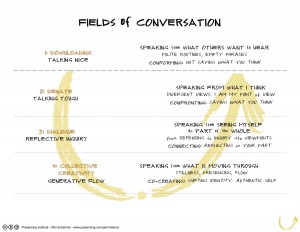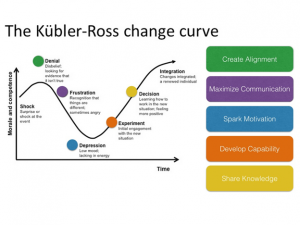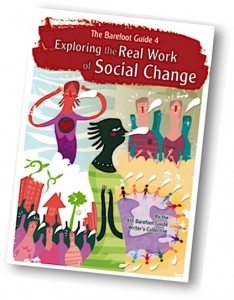Category Archives: Blog Post
Nov
There are still spaces available on ICA:UK’s Group Facilitation Methods training in Manchester on 17th -18th November, with Orla as the trainer. Booking link here
Comments Off on
Tagged | training; facilitation; workshops
Jul
10 post-referendum coping strategies
By coincidence, a couple of weeks ago, I was researching the concept of “othering” – “to view or treat (a person or group of people) as intrinsically different from and alien to oneself”. The evolution of this concept can be traced through a number of philosophers, sociologists and pyschologists, from Hegel, through De Beauvoir, and on through Lacan, Levi-Strauss, Said, Rorty….and a search for “referendum” and “othering” shows a surge in its use. I had only been delving into the term as part of my reaction to a film, and it’s dismaying that it has become so acutely relevant so suddenly: I’ve found myself using it several times a day during the past week.
My Framework colleague Gopal shared some thoughts with us on his reactionto B***xit and this catalysed some of my own thinking on how to move beyond “othering” and create some sort of functioning vision for the future. Many models of change and shock (e.g. the Kubler Ross change model – thanks, Gopal), and Otto Sharmer’s Theory U emphasise the importance of taking time to reflect and conduct ‘deep listening’, and then moving on to experimentation.
 It’s been interesting to notice, among all the noise, some really tangible initiatives around – ideas, experimentation, prototyping and implementation, all with the goal of building community cohesion and resilience, and ensuring that voices are heard from all parts of society. Some of these are a resurgence of interest in tools and techniques which have existed for many years; others are very new. The themes which seem to be emerging are, firstly, how to have meaningful conversations characterised by empathic listening across a gulf such as the one which has opened between ‘Remain’ and ‘Leave’ and secondly, how to turn those conversations into a form of democracy, widening the term beyond ‘representational democracy’, to participative and deliberative democracy? Here are a few initiatives which caught my eye:
It’s been interesting to notice, among all the noise, some really tangible initiatives around – ideas, experimentation, prototyping and implementation, all with the goal of building community cohesion and resilience, and ensuring that voices are heard from all parts of society. Some of these are a resurgence of interest in tools and techniques which have existed for many years; others are very new. The themes which seem to be emerging are, firstly, how to have meaningful conversations characterised by empathic listening across a gulf such as the one which has opened between ‘Remain’ and ‘Leave’ and secondly, how to turn those conversations into a form of democracy, widening the term beyond ‘representational democracy’, to participative and deliberative democracy? Here are a few initiatives which caught my eye:
1. The Kumi method for conflict transformation, in which some of my ICA:UK colleagues collaborated
2. Compassionate Listening engages participants in processes that “have each side seeing the humanity of the other, even when they disagree”. This approach was developed for peacebuilding in areas of acute conflict, but it now feels very relevant closer to ‘home’ (whatever ‘home’ means these days)
3. I hadn’t heard of Neighbourhood Plans before now, but they have statutory status, are developed by a group of citizens, and are concerned with local issues such as housing, transport, amenities. They have to be considered by the local authority (the legislation was introduced in 2011) and so they are a forum which goes beyond passive ‘consultation’ to more active co-creation. Some low tech tools for planning are available here
4. In Spain, Podemos have been particularly active in involving citizens in the development and running of their movement, using both face to face and online collaboration tools. The latter include using Agora Voting to shortlist their MEP candidates and using Appgree and Loomio for idea testing and decision making (Podemos have also been involved in piloting D-Cent, below)
5. The RSA launch the Citizens Economic Council next week. This is a project examining the connection between lay economic thinking and economic policy by enabling citizens to deliberate and make recommendations on future economic priorities.
6. So say Scotland is an online hub for innovation around democracy in Scotland. They use story telling, game playing, and citizens assemblies to “broaden participative and deliberative democracy as a compliment to and an evolution of representative democracy”, inspired by Iceland’s ‘Anthill’ assembly in 2009. It seems to have gone little quiet at the moment on the web, though the Facebook page is active
7. Nesta have funded D-CENT (Decentralised Citizens Engagement Technologies), which is a platform and a set of tools to enable citizen engagement. Pilots will run with existing user communities to gather knowledge and test the platform, but the system is open to movements anywhere starting to test and use the software. It is being piloted in Spain, Iceland, and Finland by organisations such as the 15M citizen movement, Citizens Foundation, Better Reykjavik and Better Iceland, and Open Ministry, a crowdsourcing site linked to the Finnish parliament. Whoops, this is a European project – what will happen to projects like these now?
8. Crowdpac, in addition to providing very detailed ‘ideological mapping’ of political candidates to make it easier to decide how to vote, also provides ‘micro delibration’ for the individual to help them work out where they actually stand, before casting their vote. This helps us to move beyond personality politics and make more informed decisions (the intention is that Crowdpac will also work to create more diversity among candidates for political office by facilitating crowdfunding for campaigns).
9. Participatory budgeting is gaining traction. Scotland’s ahead of the game here too (this post was *not* written by our Scottish Frameworker, honest!). The aim of participatory budgeting is to “address inequalities in service provision and resource allocation, engage and empower citizens in discussions on public budgets and stimulate co-production and mutual responsibility between citizens and the state”.
9.5 I confess I was stuck for #10 so I turned to one of my favourite blogs, From Poverty to Power, to see whether there might be a glimmer of light. There I found an interesting analysis of the implications of the referendum for development and aid, and a wonderful neologism, “straw clutchism”, which may be what I’m doing!
10. And then, just as I was going to post with 9½ thoughts, I received a message via one of my ICA:UK colleagues. Involve, the thinktank and charity specialising in public participation with a mission to “deepen democracy”, have issued a shout out for facilitators to “explore the different ways that we might work together to make the post-referendum debate more productive; and to provide a space for people with facilitation and engagement skills to learn more about each other and spark productive partnerships”. The mooted date for a first meeting is 22nd July.
Maybe something can be built from the ashes?
Comments Off on 10 post-referendum coping strategies
Tagged | consultation, deliberative, participation, participatory
Apr
I have just become a Fellow of the Royal Society of Arts. It’s hard to know how significant this is. On the one hand, there’s an element of the old Groucho Marx quote “I wouldn’t want to be a member of any club which would have me”, but on the other hand, I’m excited at being a member of a community of 27,000 Fellows “with the shared values of creativity, inclusivity and responsibility.” The RSA is “committed to finding innovative and creative practical solutions to today’s social challenges”. Being a Fellow is one step on a broader journey of mine where I’m taking part in conversations and finding a variety of ways to contribute to civil society over and above the work I deliver directly to clients. I’m particularly looking forward to learning more about two key themes in particular – “Public service and communities” and “Creative learning and development” . I’ll also start figuring out how I can engage with and contribute to some of the cross-cutting projects, in particular the Social Brain. And if my remote Northern location ends up limiting the extent to which I can participate in person, well, that will be a learning too, and I will just redouble my efforts in virtual workshops and virtual facilitation!
Comments Off on
Mar
Learn to facilitate fantastic virtual meetings and workshops
The revolution in remote working and virtual meetings has taken hold, but our skills haven’t necessarily kept up.
Learn to run excellent virtual meetings and workshops. ICA USA and ICA UK have been in existence for over 50 years, teaching people how to maximise engagement and participation in the voluntary and NGO sector.
Now our skills have been applied to remote facilitation.
Over 8 weeks (approximately 1.5 hours a week plus ‘homeplay’), you will:
- Gain competency leading virtual meetings with Adobe Connect, and ToP Focused Conversation.
- Build your confidence as a virtual facilitator.
- Learn tools and techniques for eliciting participation, virtual meeting design, and best practices for smooth and engaging facilitation.
No special skills or equipment needed apart from a computer with an internet connection, and a headset.
Sign up here for the next course, which starts on 5th April 2016 at 4pm BST or contact Orla Cronin for further information
Comments Off on Learn to facilitate fantastic virtual meetings and workshops
Tagged | facilitation, participation, participatory, technology, training
Feb
One of my intentions this year is to pay much greater attention to “connection”. Part of that is taking part in conversations happening both in my areas of expertise, and in the broader world of international development, civil society.
What better way to both connect *and* procrastinate than to generate a “listicle” of my 10 favourite blogs?
These are not necessarily the only or the best blogs I follow, but they provide just the right balance for me of breadth, depth, interest and technical know how.
A classic: insightful, varied, conversational and occasionally funny. Written by Duncan Green (strategic advisor for Oxfam GB)
A blogging community with guest bloggers and cross postings. A rich source of ideas and resources
Ben Ramalingam’s blog which accompanies his book. A critical perspective on NGOs and international development in general.
Institute of Development Studies, University of Sussex blog
Combines existing blogs on Impact and Learning, Knowledge Mobilisation and Impact, Participation and others into one gobal IDS blog.
Frameworker Bruce Britton’s blog on learning in NGOs
And blogs relating to my particular or current interests….
African Universities Research Approaches blog
I am currently consulting on this project, and use this blog to get a bird’s eye view of the whole programme
Chris Lysy’s glorious and astute cartoon blog on evaluation and visual data
Monitoring and Evaluation News
A rich resource edited by Rick Davies focusing on developments in monitoring and evaluation methods relevant to development programmes with social development objectives
Not quite a blog, and a work in progress, but a growing repository of expertise and tools on facilitating virtual groups and communities. Maintained by Nancy White who also blogs here.
The team at Barefoot are starting to convene the informal community which exists around Barefoot guides, starting with their blog.
And a ‘spare’: for pleasure and general ‘saw sharpening’….
Written and curated by Maria Popova, this blog regularly receives accolades in the blogosphere. According to Maria, it involves over 450 hours of work each month, and it shows.
As she describes it, Brain Pickings is “your LEGO treasure chest, full of pieces across art, design, science, technology, philosophy, history, politics, psychology, sociology, ecology, anthropology, you-name-itology”
Perfect with Sunday morning coffee! Oh, and apparently she writes standing on a wobble board. I wonder if there’s might be a causal effect between standing on a wobble board and producing a wonderful blog? I may need to do some shopping…..
Comments Off on
Feb
New tools and resources available via Framework
To celebrate Framework’s 30th birthday, we have trawled through our filing cabinets and uploaded some of our favourite tools and reports to the the resources page. Come and see us at Stand 12 at the Bond Conference on 29/2-1/3/2016 to discuss them with us (Orla will be there with her Framework hat on on Tuesday)
Feel free to use these resources, including sharing them and modifying for non-commercial purposes. A credit would be appreciated!
Tools for working in organisations which we’ve recently uploaded include:
Capacity building methods overview
Capacity building programme matrix
Monitoring & evaluating capacity building: A practical tool
Impact grid exercises to explore organisational change
Comments Off on New tools and resources available via Framework
Tagged | capacity building, evaluation, participation
Aug
Review of 2014-2015 in Framework
Bruce Britton, one of my Framework colleagues, put together this delightful animated timeline of our work as a collective covering January 2014-June 2015.
It is best viewed in full screen mode. The music is the 3rd Movement of Steve Reich’s Electric Counterpoint played by Catrin Finch
Comments Off on Review of 2014-2015 in Framework
Jun
Online training for virtual facilitation: Course starts
- Learn to lead engaging online meetings that elicit innovative thinking and creative problem-solving.
- Develop competency in leading virtual meetings using Adobe Connect and ToP Focused Conversation.
- Build your confidence as a virtual facilitator.
- Learn tools and techniques for eliciting participation, virtual meeting design, and five best practices.
Weekly online interactive session of 1.5 hours, over 8 weeks from 9th July 2015
Further information available here
Comments Off on Online training for virtual facilitation: Course starts
Apr
Open University of Catalonia/Universitat Oberta de Catalunya
I’m teaching the M&E module on the Masters in Sport for Social Coexistence and Conflict Resolution which is offered by the UNESCO-FFCB-UOC Chair at the Universitat Oberta de Catalunya. I’m really looking forward to meeting my students tomorrow and having a fast and furious romp through the mysteries and delights of monitoring and evaluation over the next five weeks.
Comments Off on Open University of Catalonia/Universitat Oberta de Catalunya
Mar
Barefoot Guide 4: Exploring the real work of social change
Delighted to see that the Barefoot Guide 4 has now been published. It is available to buy in hard copy, and is downloadable free from http://www.barefootguide.org/barefoot-guide-4—english-final.html
Proud to have helped, and looking forward to reading the finished product.
Comments Off on Barefoot Guide 4: Exploring the real work of social change




